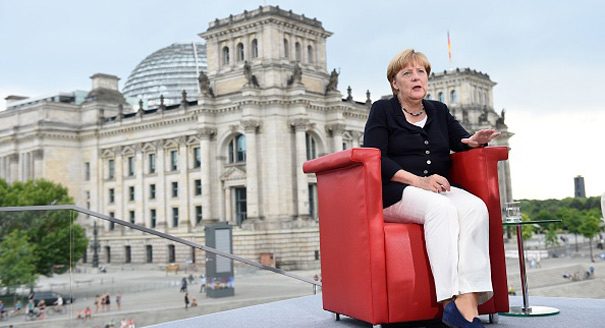Despite her mixed reputation across the EU, Angela Merkel is Europe’s undisputed leader. Over the past week it was the German chancellor who traveled across the bloc to consult with leaders about how to deal with Britain’s decision to leave the EU. The absence of the leaders of the EU institutions has been remarkable.
Merkel wanted to assess the mood across Europe before an informal summit on September 16 in the Slovak capital, Bratislava, where Brexit will dominate the agenda. But don’t expect grandiose plans or statements. As Merkel discovered during her talks, there is no consensus about how to respond to the highly dangerous situation the EU has found itself in after the Brexit decision. Yet allowing the EU to muddle through as it has done in the past, this time without Britain, is a delusion. Brexit has changed everything.
Merkel herself has no illusions about the EU’s future. “We all agree that Britain’s exit is a deep watershed,” Merkel said in a televised interview on August 28 with broadcaster ARD. “Before jumping into some kind of hectic activity, maybe we should first think calmly about what we can do better.”
She has already hinted that further integration is no longer an option, at least not in the immediate future. And even if she wanted to complete Europe’s unfinished business, particularly more economic and financial integration, it’s not in the cards. The political atmosphere throughout the EU—from elections to be held in 2017 in France and the Netherlands to a pending referendum in Italy over Prime Minister Matteo Renzi’s economic reforms—is too fragile.
Germany is in no great shape either, and this affects Merkel’s room for maneuver. The reason is that Merkel’s government has become a victim of the electoral cycle as well. State elections in Berlin and Mecklenburg–West Pomerania take place in the coming weeks. All the polls show that Merkel’s conservative Christian Democratic Union (CDU) party will do badly—not that her coalition partners, the Social Democrats, will profit from the CDU’s declining popularity.
Sigmar Gabriel, Germany’s vice chancellor and economy minister and the leader of the Social Democrats, has decided to launch a major attack against Merkel and, indirectly, the United States. It’s a desperate bid by the party to move to the left to distance itself from Merkel’s policies.
On August 28, Gabriel gave an interview to ZDF, a German public television channel (shortly after Merkel gave her interview to ARD). The contrast could not have been more revealing. Merkel stuck to her line that Germany and Europe could cope with the influx of refugees and migrants fleeing the war in Syria. That line has cost her heavily. Her trip to Prague and Warsaw on August 25–26 demonstrated wide opposition to both her decision to throw open Germany’s doors to refugees and her insistence that each EU country accept a quota system. Poland, Hungary, the Czech Republic, and Slovakia, which holds the EU Council’s current rotating presidency, have staunchly opposed such a system.
Gabriel slammed Merkel’s refugee policy, saying she had underestimated the challenge in trying to integrate so many refugees seeking asylum. “I, we always said that it’s inconceivable for Germany to take in a million people every year,” Gabriel said in the interview. “There is an upper limit to a country’s integration ability,” he added at a news conference—as if he didn’t know before now how difficult and costly it would be to integrate the more than 1 million people, the majority from Syria, who have arrived in Germany over the past year.
As if that were not enough, Gabriel turned to the Transatlantic Trade and Investment Partnership (TTIP) talks that are aimed at forging a free trade area between Europe and the United States. “The negotiations with the USA have de facto failed because we Europeans did not want to subject ourselves to American demands,” he told ZDF. But how often did Gabriel, as economy minister, go out and campaign for TTIP?
The fact is that there is a huge groundswell of opposition in Germany to the proposed agreement. Some who oppose it fear that consumer and environmental standards will be diluted. Others believe that it will be the United States that will reap all the benefits. The latter group includes a sizable dose of anti-Americanism, which Gabriel was tapping into.
Gabriel and Germany’s Social Democratic foreign minister, Frank-Walter Steinmeier, are also uncomfortable with Merkel’s policy toward Russia. Gabriel has often called for a reduction of the EU sanctions imposed on Russia in early 2014 after its annexation of Crimea and subsequent invasion of parts of eastern Ukraine.
And Steinmeier, who accused NATO of “saber-rattling” by deploying troops to the alliance’s Eastern borders, called recently for a new nonproliferation deal on conventional arms that would be “a proven means for transparency, risk prevention and trust building.” He said he wanted to avert a “new and dangerous arms race” to ensure peace in Europe and beyond. “At the same time, we must all be united in the desire to avoid a further twist in the escalating spiral.”
NATO too wants to avoid any accidents with Russia. But Germany’s Social Democrats, unlike Merkel, still hanker after a broad European security architecture in which Russia would have some role. Merkel made it clear during her ARD interview that sanctions would not be lifted.
With her coalition partners having now decided to spar openly with Merkel at a time when Europe is in such flux, she has few options but to keep Berlin at the helm of Europe. There’s no one else—which shows the paucity of leadership throughout a fragile bloc.
Asked to declare whether she’ll seek a fourth term as chancellor after next year’s federal election, Merkel remained noncommittal. “I will report to you on that at the appropriate time,” she said. One wonders who would want her job.






